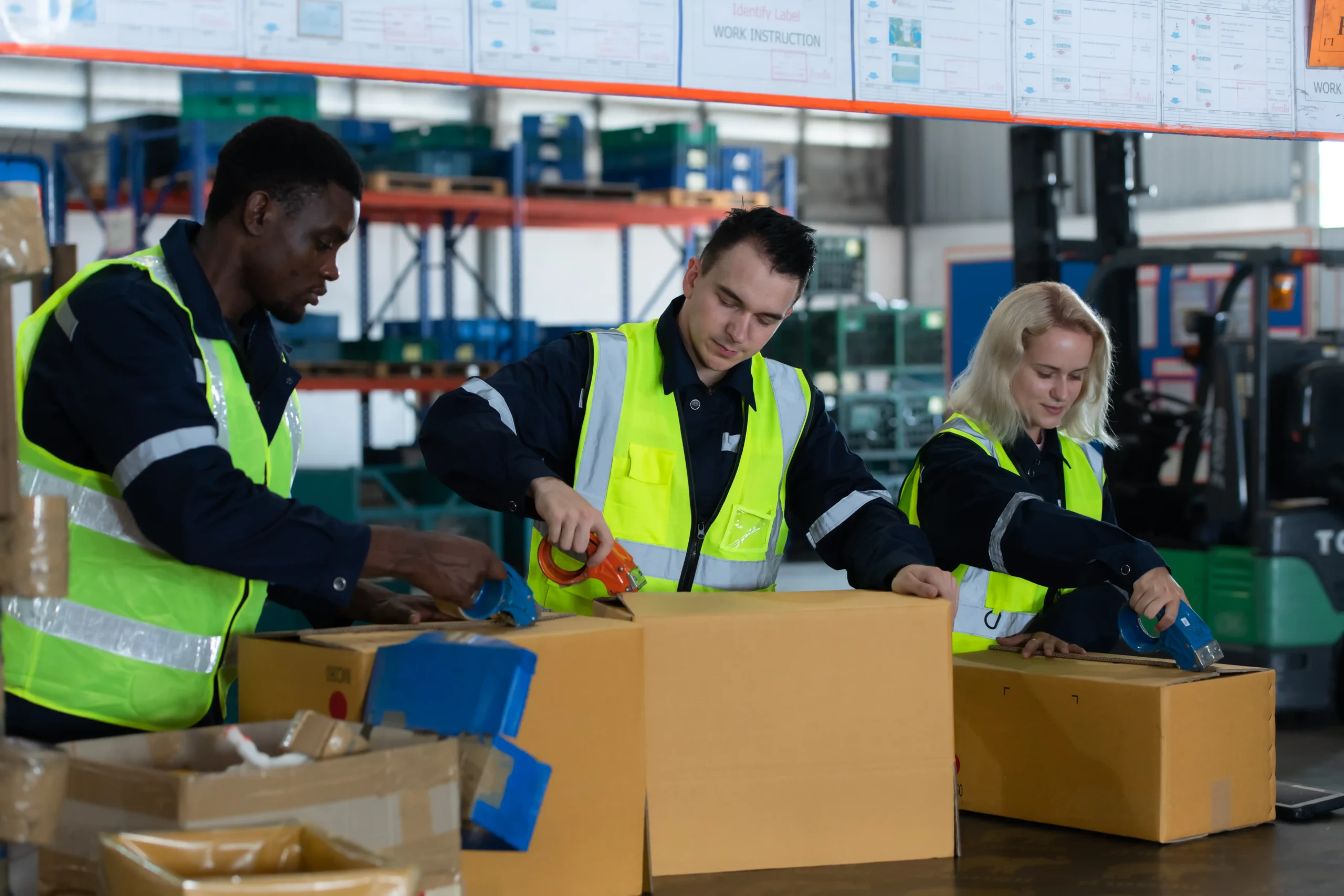Table of Contents
ToggleA sector-specific supply chain refers to a tailored logistics strategy designed to address the unique needs, regulations, and challenges of a specific industry. Unlike a generalized approach to logistics, these supply chains integrate industry-specific requirements, whether it’s ensuring temperature control for pharmaceuticals or managing rapid order fulfillment in e-commerce.
The goal is to create an efficient, reliable, and flexible supply chain that meets the operational demands of the industry while enhancing customer satisfaction. At Tri-Link FTZ, we have specialized in creating sector-specific supply chain solutions for over three decades.
These customized strategies are not just about transporting goods—they’re about aligning logistics with the heartbeat of an industry to ensure seamless operations. Whether it’s handling high-value electronics or optimizing reverse logistics for retail, we’ve seen firsthand how a focused approach drives success.

Over the years, I’ve learned that a one-size-fits-all logistics strategy just doesn’t work in today’s complex global economy. Each industry has its own set of demands, challenges, and compliance requirements.
For instance, the food and beverage sector relies heavily on cold chain logistics to maintain freshness, while industries like aerospace require extreme precision and strict regulatory compliance. Sector-specific supply chains are critical because they allow businesses to meet these unique demands without compromising efficiency or quality.
They also enable organizations to build resilience, ensuring their supply chain can adapt to market fluctuations, global disruptions, and shifts in consumer behavior. For example, during the pandemic, companies with tailored supply chain strategies were better positioned to pivot and maintain operations despite unprecedented challenges.
The success of these supply chains comes down to understanding the nuances of an industry. At Tri-Link FTZ, we’ve spent decades studying these nuances, from how pharmaceuticals need strict temperature monitoring to how fashion brands require secure, cleanroom storage for high-value goods.
By focusing on sector-specific solutions, we help our clients not just survive but thrive in their industries.
When it comes to logistics, every industry has its own language, and understanding that language is key to delivering results. Let’s take a closer look at some industries where sector-specific supply chains make the most impact.
Pharmaceutical logistics demand precision, compliance, and constant monitoring. From maintaining temperature-controlled environments for vaccines to adhering to Good Distribution Practices (GDP), every step must be flawless. At Tri-Link FTZ, we’ve developed robust systems to ensure the integrity of sensitive products, whether they’re being shipped across the country or internationally.
High-value electronics require secure handling and tracking to prevent theft or damage. Our sector-specific supply chain solutions include advanced tracking systems, anti-theft packaging, and reliable transportation networks.
This ensures products like microchips or consumer electronics reach their destination safely and efficiently.
E-commerce thrives on speed and accuracy. A tailored supply chain for this sector includes streamlined order fulfillment, reverse logistics for returns, and last-mile delivery optimization.
These elements are essential for meeting consumer expectations in a highly competitive market.
The food industry relies on cold chain logistics to maintain product quality from farm to table. From frozen seafood to fresh produce, our solutions ensure that temperature-sensitive goods stay within the required ranges throughout their journey.
Aerospace supply chains require impeccable accuracy and compliance with stringent international regulations. Whether transporting aircraft components or managing global distribution networks, sector-specific logistics provide the reliability and precision this industry demands.
Building an effective sector-specific supply chain requires a combination of expertise, technology, and infrastructure. Over the years, I’ve seen five key components consistently make the difference:
Every industry has unique needs, and customization is the cornerstone of sector-specific supply chains. From tailored packaging solutions to industry-specific compliance protocols, flexibility is key.
Secure, temperature-controlled warehouses, specialized vehicles, and cleanroom facilities are just a few examples of the infrastructure required for certain industries. At Tri-Link FTZ, we’ve invested in state-of-the-art facilities to support diverse client needs.
Technology like IoT devices, predictive analytics, and blockchain enables real-time monitoring, risk reduction, and enhanced transparency. For example, IoT sensors can monitor the temperature of pharmaceutical shipments, ensuring compliance throughout the journey.
Many industries operate under strict regulatory frameworks. Sector-specific supply chains incorporate compliance at every level, from documentation to transportation, to avoid costly penalties and delays.
Industries evolve, and supply chains must evolve with them. A sector-specific strategy should be scalable to accommodate growth, new market demands, and technological advancements.

While sector-specific supply chains offer tremendous advantages, they’re not without challenges. Regulatory compliance can be a maze, particularly in industries like pharmaceuticals or aerospace.
Staying updated on changing laws requires constant vigilance and expertise. That’s where companies like Tri-Link FTZ step in, providing the knowledge and systems needed to navigate these complexities.
Another challenge is cost management. Tailored solutions often require higher initial investments in infrastructure, technology, or training.
However, the long-term benefits—such as reduced waste, improved customer satisfaction, and fewer disruptions—far outweigh these costs. Sustainability is also an area where challenges arise.
Industries are under increasing pressure to adopt eco-friendly practices, and implementing these changes can be resource-intensive. By consolidating shipments, using renewable energy in our facilities, and optimizing routes, we’ve helped our clients make their supply chains greener without sacrificing efficiency.
Technology is a game-changer in modern logistics. From IoT devices to blockchain, innovative tools enhance visibility, reduce risks, and improve overall efficiency.
For example, predictive analytics allows companies to anticipate disruptions and adjust operations proactively. In the food industry, temperature sensors ensure perishable goods remain fresh throughout transit.
Blockchain technology is particularly impactful, providing an immutable record of transactions. This is crucial in industries like pharmaceuticals, where traceability and authenticity are non-negotiable.
At Tri-Link FTZ, we’ve integrated these technologies into our operations, ensuring our clients benefit from the latest advancements. Read more here.
Sustainability is no longer optional—it’s a business imperative. Sector-specific supply chains have a unique opportunity to drive environmental change.
By adopting green technologies, optimizing routes, and reducing waste, industries can significantly lower their carbon footprint. At Tri-Link FTZ, we’re committed to sustainability.
From using energy-efficient systems in our warehouses to implementing recycling programs, we ensure our operations align with global environmental goals. For our clients, these practices not only benefit the planet but also enhance their reputation among eco-conscious consumers. Read more here.
A sector-specific supply chain is more than just a logistical approach—it’s a strategic advantage that can revolutionize the way industries operate. By tailoring logistics to the unique demands of each sector, businesses can improve efficiency, reduce costs, and enhance customer satisfaction.
Whether it’s maintaining temperature-sensitive shipments for pharmaceuticals, optimizing last-mile delivery for e-commerce, or ensuring regulatory compliance for aerospace components, these targeted solutions make a tangible difference. At Tri-Link FTZ, we’ve spent over 35 years refining our expertise in third-party logistics and foreign trade zones.
Our experience has taught us that the success of any supply chain lies in its ability to adapt and align with the industry it serves. By investing in advanced infrastructure, leveraging cutting-edge technology, and fostering sustainability, we’ve helped countless clients overcome challenges and unlock new opportunities.
As we move into the future, the importance of sector-specific supply chains will only grow. Global markets are becoming increasingly competitive, and businesses that embrace tailored logistics solutions will have a clear edge.
If you’re ready to transform your supply chain and position your business for success, we’re here to help. Contact Tri-Link FTZ today to discover how our sector-specific strategies can elevate your operations.
Share this article
We have other resources available upon request as well as one-on-one support and personalized answers, just like our services.
Simply contact us anytime and we’ll get back to you to answer your questions and provide meaningful answers that show you how Tri-Link supports your logistics, reduces costs, and accelerates efficiency.
Tri-Link delivers exceptional FTZ and 3PL services tailored to your global trade needs.
Our solutions combine innovation, quality, and efficiency to exceed your expectations and meet your specific requirements.